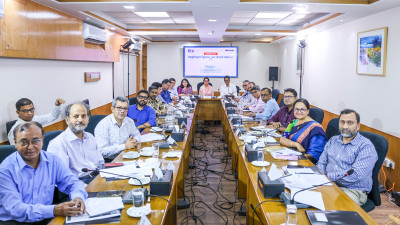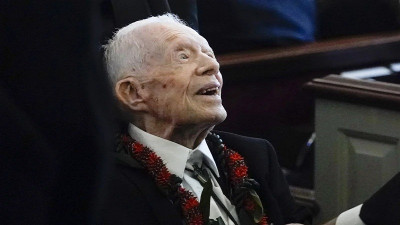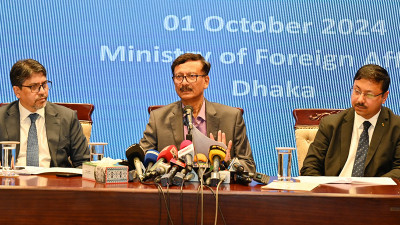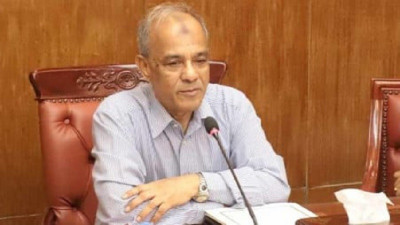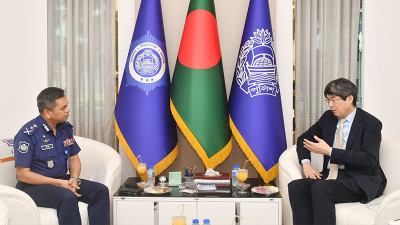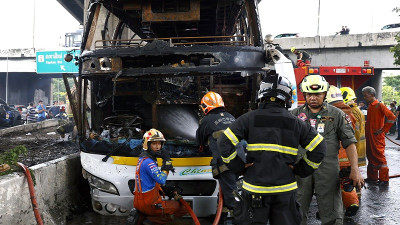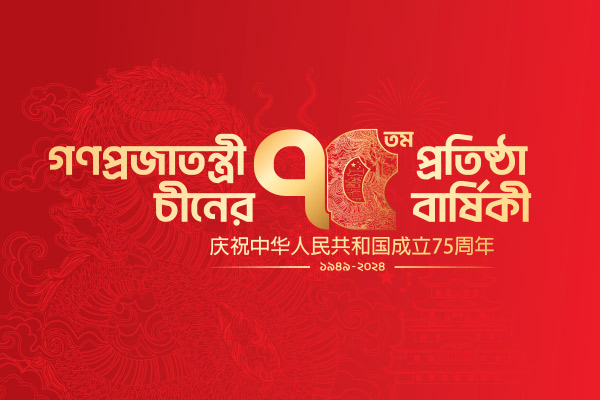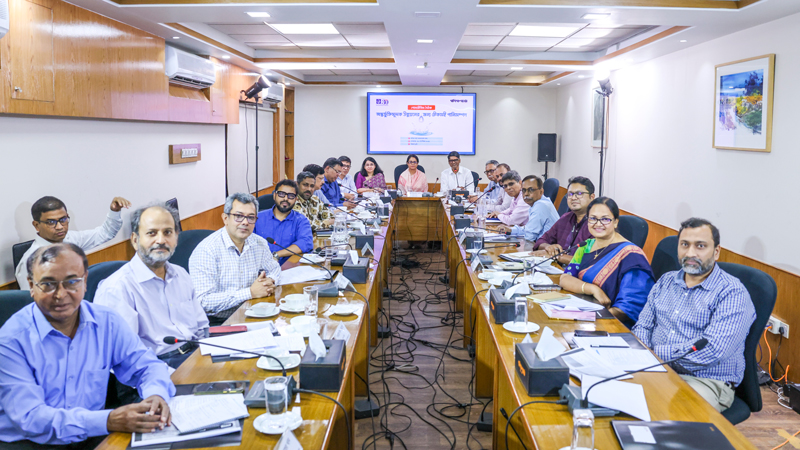 Photo: Staff Photographer
Photo: Staff Photographer Much of the country's economic structure relies on water
resource management. Considering the economic, social, and environmental
context, the scope of water is quite extensive. However, due to the unplanned
management of this sector, people from all walks of life are suffering, while
most rivers are dying due to encroachment and pollution. In this situation, we
must develop sustainable and updated water management practices to protect
water resources. We also need to shift away from project-based activities and
focus on what can be done to achieve greater effectiveness.
These remarks were made during a roundtable meeting
titled "Sustainable Water Resources for Inclusive Development," held
on Monday (September 30) in the capital. The Center for Policy Dialogue (CPD)
and Bonik Barta jointly organized the event, which took place in the conference
room of Bonik Barta's main office in Karwan Bazar. The chief guest was Syeda
Rizwana Hasan, the government's adviser on environment, forest and climate
change, and water resources.
The chief guest said, "There is no water-related
issue in this country that you won't find. Arsenic, salinity, pollution,
plastic pollution—everything is present here. Our perspective on water is
focused solely on large projects. Restoring any one canal requires a budget of
BDT 7 billion. However, ensuring that public money is optimally used in these
projects is also significant."
The adviser to the interim government believes that we
need to shift away from project-based activities and consider what can be done
to achieve greater effectiveness. Most projects in our country are undertaken
for political reasons.
Referring to the miserable living conditions of the
people on the banks of the Teesta, Syeda Rizwana Hasan said, "The people
of Teesta are now losing everything. They lose their possessions during floods
and again during riverbank erosion. When I visited the Cumilla, Feni, and Noakhali
regions, the people there had one complaint: the floodwaters were not receding.
The sole reason for this is that all the canals have been infringed upon, and
the mouths of the rivers have been obstructed. There is no arrangement for the
water to flow into the Bay of Bengal, as various obstacles are in place."
Adviser Rizwana Hasan continued, "We have laws, but
they are also cumbersome. The water policies have not been framed into a
coherent Water Act. There is a significant gap between the Water Act and the water
policy. When a project is designed, there is often no fieldwork conducted with
the relevant stakeholders in the region where these projects will occur.
Discussing these projects with local government, district administration, and
local communities could lead to significant cost savings."
In the roundtable meeting, the keynote address was
presented by Dr. Fahmida Khatun, Executive Director of the Center for Policy
Dialogue (CPD). She said, "The scope of water is vast. We have discussed
water management in economic, social, and environmental contexts. We talk about
development but do not discuss its social and environmental aspects.
Environmental disasters affect all people, but the marginalized sections of
society suffer the most, preventing sustainable and inclusive development. In
the past, while emphasizing GDP growth and economic development, the
improvement of environmental and social sectors and other areas was neglected.
As a result, inequality and environmental issues have emerged."
She said, "The structural change in the economy is
based on water. There has been progress in drinking water supply in Bangladesh,
but it has not been available to everyone. We need to update sustainable water
management and national water governance to advance the economy, society, and
environment—these three branches. Coordination among various ministries and
departments is essential. The proper enforcement of water resource protection
laws must be ensured."
In the roundtable meeting, Dr. Ainun Nishat, an Emeritus
Professor at BRAC University, said, "Food security in Bangladesh has been
ensured based on water resources. Significant investments were made in the
water sector during the 1960s, 1970s, and 1980s, leading to extensive
infrastructural development. This was primarily achieved through private
initiatives. Now, there is a need to dismantle the Water Development Board and
create a new Water Management Board."
Emphasizing the importance of rivers for water resources,
Abu Taher Khan, a former director of the Bangladesh Small and Cottage
Industries Corporation (BSCIC), said, "It is not enough to prioritize
rivers solely for water conservation; we also need to raise awareness among the
general public about the canals, beels, ponds, and other water bodies in rural areas
that are being filled in and becoming waterless. Local government can
effectively carry out this work."
At the roundtable meeting, various speakers included
Mohammad Ziaul Haque, Director of the Department of Environment (Air Quality
Management); Dr. Shahriar Hossain, Secretary General of the Environment and
Social Development Organization; Dr. Kazi Matin Uddin Ahmed, Professor of the
Geology Department at Dhaka University; Gauhar Naeem Wara, Member Secretary of
the Foundation for Disaster Forum; Mohammad Tahmidul Islam, Head of Technical
Services at WaterAid Bangladesh; Dr. Mohammad Liaquat Ali, Director of BRAC’s
Climate Change Program; Rabeya Begum, Chairperson of the Climate Action Network
South Asia; Professor Masfiqus Salehin from the Water and Flood Management
Institute at Bangladesh University of Engineering and Technology (BUET); Dr.
Mohammad Sirajul Islam, Professor of Civil and Environmental Engineering at
North South University and Director of the Center for Infrastructure Research
and Services (CIRS); Mohammad Ejaz, Chairman of the River and Delta Research
Center; Professor Mohammad Ataur Rahman from the Water Resources Engineering
Department at BUET; Mohammad Shamsuddoha, Chief Executive of the Center for
Participatory Research and Development; and Mahbub-Ul Alam, Associate Scientist
at the Environmental Health and WASH Research Group of icddr,b. Dewan Hanif
Mahmud, editor and publisher of Bonik Barta, conducted the welcome address and
moderated the event.

